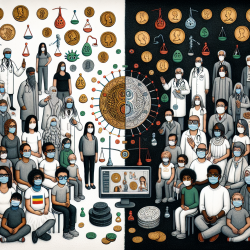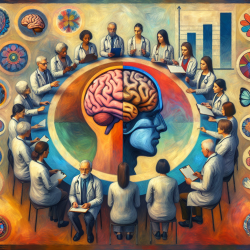Introduction
In the ever-evolving landscape of medical education, the inclusion of residents with disabilities has become a focal point of discussion. A recent study published in JAMA Network Open titled "Program Access, Depressive Symptoms, and Medical Errors Among Resident Physicians With Disability" sheds light on critical issues faced by resident physicians with disabilities. This blog aims to distill key findings from the study and explore how practitioners can leverage these insights to improve their skills and contribute to better outcomes for residents and patients alike.
Understanding the Study
The study conducted a comprehensive survey of U.S. medical interns to assess the prevalence of self-reported disabilities, program accommodations, and the association between these factors, depressive symptoms, and self-reported medical errors. The data was collected from 282 institutions across 22 specialties, providing a robust dataset for analysis.
Key findings from the study include:
- A prevalence of 7.5% of residents self-reported having a disability.
- Residents with disabilities who did not have their program access needs met exhibited a statistically significant increase in depressive symptoms compared to their peers.
- These residents were also more likely to self-report major medical errors.
Implications for Practitioners
For practitioners, these findings underscore the importance of creating an inclusive and supportive environment for residents with disabilities. Here are some actionable insights:
- Advocate for Accessibility: Ensure that program accommodations are readily available and that residents are aware of their rights to request them. This can significantly reduce depressive symptoms and improve performance.
- Foster Open Communication: Encourage an open dialogue about disabilities and accommodations. This can help reduce stigma and empower residents to seek the support they need.
- Implement Regular Assessments: Conduct regular assessments of residents' mental health and program access needs. This proactive approach can help identify issues early and provide timely interventions.
Encouraging Further Research
The study highlights the need for ongoing research into the experiences of residents with disabilities. Practitioners can contribute to this body of knowledge by:
- Participating in Research: Engage in or support studies that explore the intersection of disability, mental health, and medical errors.
- Sharing Best Practices: Document and share successful strategies for accommodating residents with disabilities within your institution.
- Collaborating with Stakeholders: Work with medical schools, residency programs, and accreditation bodies to develop policies that prioritize accessibility and inclusivity.
Conclusion
The study "Program Access, Depressive Symptoms, and Medical Errors Among Resident Physicians With Disability" provides valuable insights into the challenges faced by residents with disabilities. By implementing the findings and advocating for further research, practitioners can play a pivotal role in creating a more inclusive and supportive environment for all residents, ultimately leading to better patient care and outcomes.
To read the original research paper, please follow this link: Program Access, Depressive Symptoms, and Medical Errors Among Resident Physicians With Disability.










